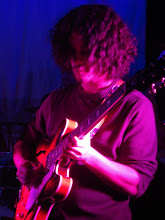Often when people start playing guitar they have serious misconceptions about what they’re going to be doing. They think it’s going to be easier or more fun than some other instrument like piano or violin that they hated playing as a kid. This is especially true of young people around the age of 12. Nowadays, many of them may have become inspired by Guitar Hero or Rock Band to go for the real thing. They don’t understand that as hard as it may be to play on expert mode, it’s a whole lot harder to play the real thing on beginner.
My first goal is to make them excited about music. They will never succeed if they are not self motivated. There can be no external awards, no marks or distinctions, only their own sense of satisfaction at attacking a problem. I want them to see that music is a beautiful and deep thing, that it is more than an iTunes playlist on shuffle, more than the next hit single which sounds like the last one and is deliberately ‘manufactured’ to generate profits. I want them to want to learn.
I give them no theory. They don’t read music. There’s no set game plan. We don’t have to finish what we start. Every consideration is secondary to keeping these young people interested. Months will go by where everybody involved, including myself and the parents, wonder if progress is really being made.
Eventually, the day comes where I realize the child is much more mature than they were before. They are beginning to ask questions, beginning to wonder how and why things work the way they do, beginning to practice more without anybody bothering them because they want to know.
Often, however, their excitement about the questions is followed by a very underwhelming reaction to the answer. This is because the answer is so much huger than they can be made to see in an hour or even a year. If a child who can strum a few chords, barely remembers their name, can find notes by ear but can’t be bothered to know what they’re called, asks you how the G major chord got its name, or how to figure out a tune by ear, the explanation is quite massive. They must be made to understand the major scale, the concept of a triad, the names of the notes, intervals (which is not intuitively represented spatially on the guitar), as well as keys and tonality, to really understand the answer to these questions. And of course, they must understand it in the least abstract sense. They must connect all these concepts to sounds, to the physical act of playing their instruments, or else the whole exercise is completely meaningless.
So when the big questions start rolling in, I like to tell them a story about mountain climbing. They ask me what appears to be a very simple question, and they see me sigh and refuse to answer them. The next week they are learning the major scale, being forced to sing out pitches, and doing all these things that don’t seem to matter. Why am I making them do it?
I tell them that the answer to their question is on the other side of a giant mountain. There is no possible way for them to see the place to which they are heading, and the path there is long, winding, and difficult, and it is very easy to get lost or detoured. It is going to take a long time to climb the mountain to reach a point where they can see their destination. Furthermore, they must be guided by someone who knows the way. I am their guide and they must trust that I know the mountain path because I have travelled it before with someone who taught me how to navigate the treacherous route. If they truly want to reach their destination, they need to have faith in their mountain guide, their musical sherpa, to know how to get to the mountain’s peak. That’s good teaching.
Subscribe to:
Post Comments (Atom)

No comments:
Post a Comment